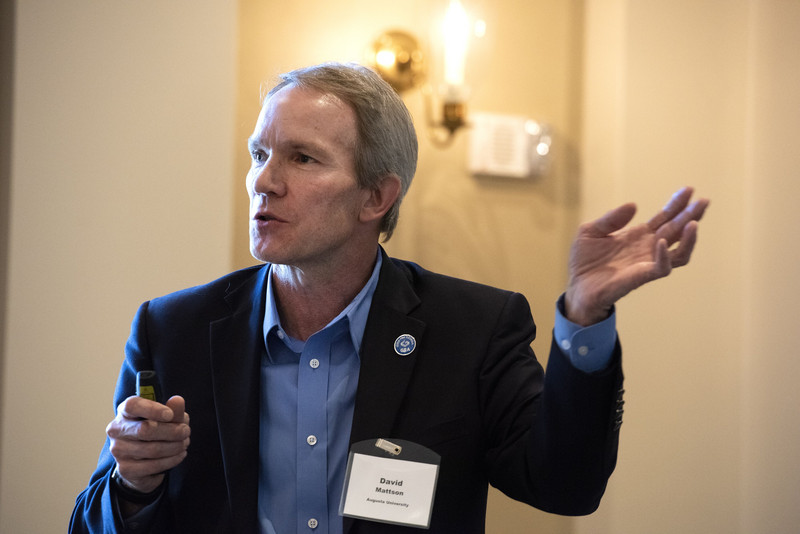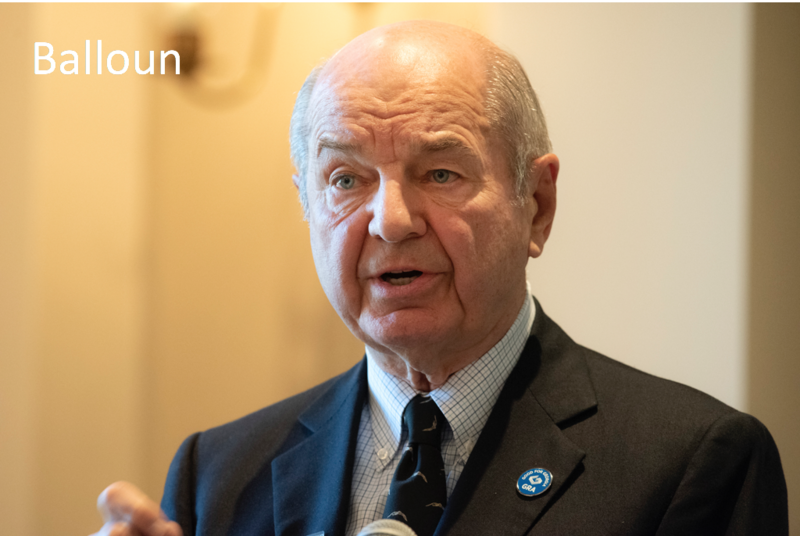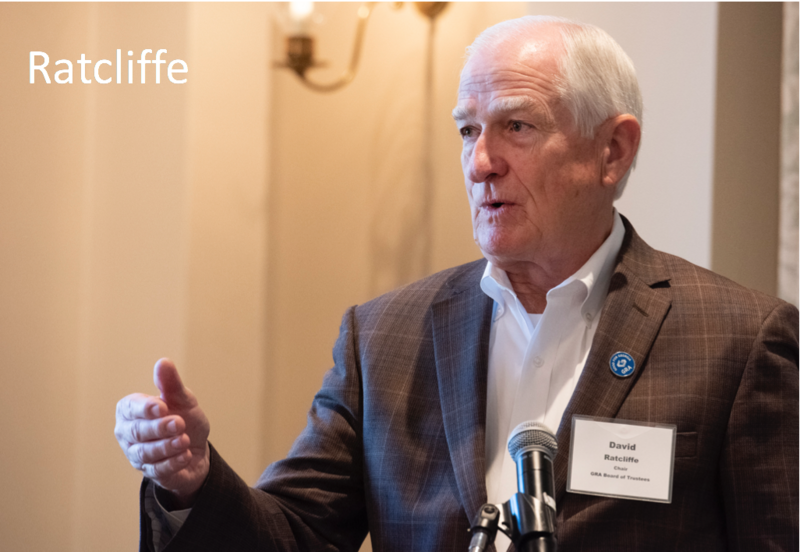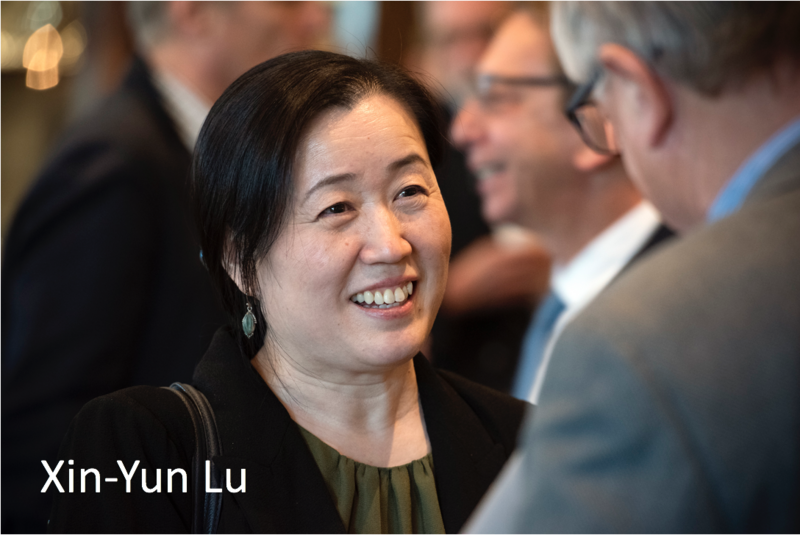January 29, 2020
Meeting of the magnificent minds
Our notebook from the 2020 Academy of GRA Eminent Scholars

Synthetic chemistry could yield compounds that defeat drug-resistant bacteria. Electrical power generation and distribution is changing at a staggering pace. Genetically identical twins experience high blood pressure differently.
Emerging drugs for cystic fibrosis will increase life expectancy by decades. Drugs that treat other ailments are being re-purposed to fight debilitating inflammation. And a new class of inhibitors may well be the secret to solving myeloid leukemia.
These are just some of the takeaways from a bright January afternoon spent with some of Georgia’s most brilliant scientists.
The occasion was the Academy of GRA Eminent Scholars, an informal colloquium that brings together the men and women GRA helped recruit to endowed chairs at Georgia’s universities. Held this year at the East Lake Golf Club, the Academy gave the Scholars a chance to share short-take science, ponder entrepreneurship and ruminate on ways to increase diversity in the field.
The day kicked off with acknowledgment of GRA’s 30th anniversary, a milestone marked not with cake and champagne, but through a retrospective of the Alliance’s impact on Georgia. GRA VP Amanda Schroeder toured the Scholars through the ways GRA has helped the state attract outside money, prepare a high-skilled workforce and elevate its reputation.
 “The Academy of Eminent Scholars has brought nearly $5 billion to Georgia in research grants and contracts,” Schroeder told the gathering, “and GRA-supported startups have attracted $1.2 billion in outside venture investment. We hear again and again that Georgia is unique – because business, government and academia are all at the table through GRA, and because our universities actually work together in the area of research.”
“The Academy of Eminent Scholars has brought nearly $5 billion to Georgia in research grants and contracts,” Schroeder told the gathering, “and GRA-supported startups have attracted $1.2 billion in outside venture investment. We hear again and again that Georgia is unique – because business, government and academia are all at the table through GRA, and because our universities actually work together in the area of research.”
From there, the room traveled back in time. Jim Balloun, the retired chairman and CEO of Acuity Brands and one of GRA’s founding board members, recounted how Georgia came to have a GRA. One factor, he said, was that “our state was losing qualified engineers and scientists to other states because the jobs weren’t here for them.” Leaders in business and government conceived of GRA to be “a spark for creating critical mass” of research and entrepreneurship.
“You just can’t imagine what a change this was for our state,” Balloun said.
GRA’s current chair, David Ratcliffe, followed Balloun and described how the Alliance is now working to restore its funding to further enrich Georgia’s economy and reputation. “We want to get to the point where others are talking about the amazing research taking place in our state,” Ratcliffe said. “Because the capability in this room is a game changer for Georgia.”
The next few hours brought a series of presentations from several of the Scholars, beginning with the Class of 2019:
- Lin Gan of Augusta University shared highlights of his pioneering work with the gene editing technology CRISPR, as well as his goal of establishing a statewide genome editing facility;
- David Mattson, also of Augusta, discussed findings and implications from his exploration of salt-sensitive hypertension, a leading killer in Georgia;
- David Crich of the University of Georgia described how he’s leveraging the diversity of chemistry to develop new drugs and medicines; and
- Jorge Cortes, who leaders the Georgia Cancer Center at Augusta University, presented the progress he’s made in developing inhibitor drugs to help the body battle myeloid leukemia.
A host of other scholars followed with a series of “six-minute science” presentations of their work. These ranged from a new model to prepare a high-skilled workforce (that’s being exported across the world) to a drug development platform for new cystic fibrosis treatments to a potential vaccine that fights invasive fungal infections.
 Getting more of this extraordinary science out of the lab and into the world was the topic of a late-afternoon panel discussion led by Lee Herron, GRA’s VP for venture development. Three university researchers – who, combined, have launched six startup companies – talked about the challenges and considerations of university entrepreneurship. Wilbur Lam and Mustaque Ahamad of Georgia Tech, and Lance Wells of UGA, together journeyed through such topics as how to:
Getting more of this extraordinary science out of the lab and into the world was the topic of a late-afternoon panel discussion led by Lee Herron, GRA’s VP for venture development. Three university researchers – who, combined, have launched six startup companies – talked about the challenges and considerations of university entrepreneurship. Wilbur Lam and Mustaque Ahamad of Georgia Tech, and Lance Wells of UGA, together journeyed through such topics as how to:
- work with campus tech transfer offices (keep them in the loop and spend time on those invention disclosures);
- comply with conflict of interest policies (for starters, don’t involve students in startups until after graduation); and
- preserve the confidentiality of intellectual property while openly publishing papers on research (use publishing to validate concepts and de-risk technologies with high market potential).
